
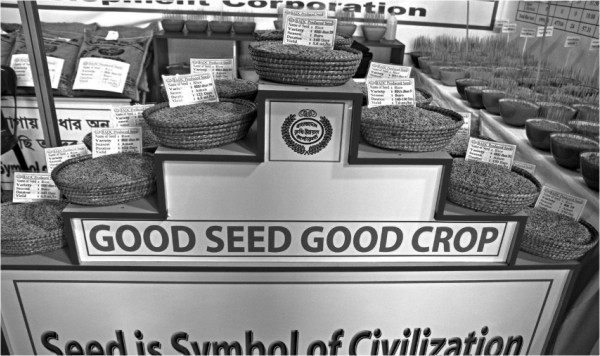
Photo: Amdadul Huq/driknews
Biotechnology's untapped potential
By Dr. Md. Saidul Islam
Biotechnology is one of the most important scientific and technological revolutions that have greatly influenced our lives. The traditional applications of this technology have been with us for centuries, for example, the use of yeast in bread or use of bacteria in yoghurt. Unraveling the structure of DNA by Watson and Crick in 1953 was the most important discovery in 20th century. In fact, this discovery has initiated a new era in science which we now called modern biotechnology. Like traditional biotechnology, modern biotechnology also uses living organisms or parts of living organisms but with very specific or desirable characteristics in the products. Biopesticides, bio-fertilizers, bio-fuels, bioremediation etc., are the contribution of modern biotechnology keeping environment ecofriendly and sustainable. Biotechnology is not just a technological matter; its development involves cutting-edge science, political, legal, and economic variables, and external and internal negotiations and also to address the social and ethical challenges.
Bangladesh is one of the most populous countries in the world and we have basically an agricultural economy. Our land and resources are limited but we have to feed continually increasing population within the limited resources. There is a growing need to develop stress tolerant crop varieties to combat climate change induced disasters like flood, drought and intrusion of salinity. Improvement of fisheries & livestock, biodiversity conservation, biological & industrial waste management, health care systems, forestry & environment sectors deserve much attention. Biotechnology can play important roles to address the above issues.
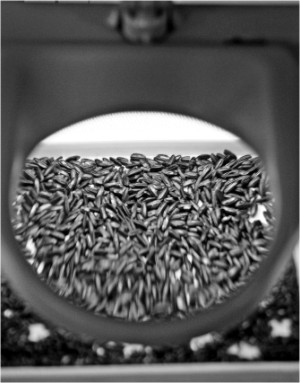 |
Photo: Amdadul Huq/driknews |
During the last 35 years a considerable progress has been achieved in the field of modern biotechnology. Within this short span of time recombinant DNA technology, which was hitherto considered primarily a fundamental subject has proved beyond doubt its applicability in several areas of human welfare. Many Asian countries, namely India, China, Philippines, Thailand, Pakistan, Malaysia, and Vietnam have recognized the potential of these techniques in contributing economic growth in an environmentally safe manner. They have made significant strides in the development and commercialization of biotechnology over the past two decades. Our neighboring country, India for example has taken the advantages of this technology in a wide variety of areas, including crop management, forestry, biopesticides, and biofertlizers. Through international collaboration Kenya has taken national policy in developing transgenic plants resistant to pathogens or environmental stress as well as vaccines for livestock. While other countries including our neighbours have made or are making impressive progress in biotechnology, Bangladesh has not yet made much headway in this field. Some work has been initiated using the techniques of genetic engineering for the improvement of plants, animals, industrial micro-organisms and also to combat environmental pollution problems.
Government of Bangladesh has taken significant initiatives to promote biotechnological research and infrastructure development in the country for enhanced productivity, quality and value of products, stability of production systems and environmental conservation leading to sustained food security, poverty alleviation and livelihood security. Currently, several research organizations, public and private universities, private companies (Biotech seeds, Genetic seed, Grameen Krishi Foundation, Rantic Ltd., Lal teer seed company, Matex BD Ltd., Safe Agriculture BD, East West Seed Company) are involved in promoting environmentally safer agricultural and industrial biotech products), a number of NGOs (BRAC, DEBTECH, PROSHIKA, Swiss organization for Development and Cooperation and others, Institute of Integrated Rural Development, Rural Development Academy) are involved on Plant tissue culture. BRAC, Gaizpur; Square Agric-tech, Uttara; and Aman Agro Industries at Rajshahi are producing virus-free seed potato in substantial quantities, reducing our dependency gradually on imported potato seeds.
The programme on plant biotechnology in Bangladesh was initiated in late 1970s in the Department of Botany, University of Dhaka. Presently, a number of private organizations and NGOs are also working on plant tissue culture. Protocols on plant regeneration and micro propagation have been developed on different crops, forest plants, ornamental and fruit trees as well as vegetables. Some work has been initiated on Agrobacterium mediated genetic transformation of rice, jute, oil seed, potato, chickpea, papaya for insect, fungus and virus resistance; genetic transformation of pulses for fungus resistance, salinity and drought tolerance; and nutritional enrichment/improvement. Research on use of DNA probes for the diagnosis of diseases; development of food, fiber and energy through recombinant DNA technology and DNA fingerprinting of rice, jute and some other crops are in progress.
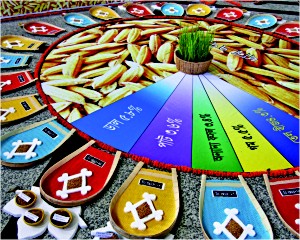 |
Photo: Amdadul Huq/Driknews |
Bangladesh has become vulnerable to climate change, expediencies frequent cyclone, flood and drought. A rise of sea level and reduced flow of upstream may turn the situation worse in near future. Every year crop plantation in our country suffers from drought, salinity and flood. Drought hurts cultivation on nearly 9 lakh hectares, while flood affects farming on about 20 lakh hectares of land.
Farmers have received new high-yielding rice seed varieties to grow rice on submerged and salinity-prone lands. The rice variety BR11 Sub-1 would help farmers preventing up to a million tones of annual crop loss caused by flash floods during Aman season.
There are around 2.8 million hectares of agricultural land in the coastal districts. Saline tolerant seed BRRI Dhan47, BINA8 and others local varieties are being grown in the coastal region during boro season, which might bring a dramatic change in rice production.
Substantial progress has been achieved in developing transgenic plants of some key crop plants (rice, jute, brinjal, grain legumes, potato, etc.) in the country. It has been identified that brinjal, tomato and country bean, where pesticide applications are excessive and indiscriminate. To get relief from the pesticide residue problem and to minimize the production loss, researchers of Bangladesh Agricultural Research Institute have developed genetically modified Bt brinjal with an additional gene Cry1Ac from soil bacterium, Bacillus thuringiensis (Bt) which is resistant to destructive insect pest brinjal shoot borer, BARI has performed two cycles of confined field trails of fruit and shoot borer resistant Bt-brinjal. Bt-brinjal could make a significant contribution to pesticide residue problem and to minimize the production loss. Bangladesh Rice Research Institute (BRRI) is now conducting greenhouse trials of imported Golden rice.
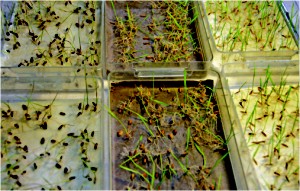 |
Photo: Amdadul Huq/Driknews |
Bangladesh is expected to grow genetically modified (GM) rice variety known as golden rice by 2012. The rice variety, rich in vitamin 'A', will help meet the deficiency of the particular vitamin, lack of which causes childhood blindness and weaken immune system. BRRI is conducting research to develop the variety of golden rice through transferring gene of beta-carotene from maize into BRRI Dhan-29, the highest yielding rice variety of the country. Apart from Bangladesh, research on commercial production of golden rice is also going on in Indonesia, India, the Philippines, Vietnam and China.
Biotechnology in health care and diagnostic services is at the preliminary stage. The two organizations engaged are International Centre for Diarrhoeal Disease Research, Bangladesh (ICDDR,B) and Institute of Public Health (IPH). In the ICDDR,B PCR and microsatellite marker based diagnosis of diarrhoea, cholera and hepatitis A, B, C has been established. Development of Shigella vaccine is being carried out at ICDDR,B. However, R&D of animal genetic engineering is very limited in the country.
The IPH is engaged in the production of vaccines and antisera. Intensive effort of scientists of IPH has made small pox eradication program successful by producing sufficient quantity of highly potent small pox vaccines. Since 1992 the IPH is also engaged in the production of high quality tetanus vaccines. Incepta, a leading pharmaceutical company in the country has signed an agreement with International Center for Genetic Engineering and Biotechnology (ICGEB), New Delhi Unit, for commercially manufacturing hepatitis B vaccine.
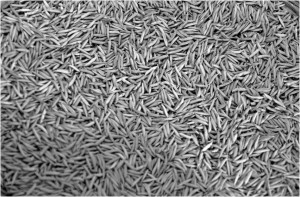 |
Photo: Amdadul Huq/Driknews |
Animal biotechnology encompasses a broad range of techniques for the genetic improvement of animal species, animal vaccines and development of rapid test kits to diagnose the health of livestock and companion animals. Bangladesh Livestock Research Institute (BLRI), Bangladesh Agricultural University (BAU) and National Institute of Biotechnology (NIB), are working on animal biotechnology. Techniques of traditional biotechnology like artificial insemination and selective breeding are being practiced extensively in the country. In vitro fertilization and embryo transfer have been carried out successfully in the laboratories and in field trials, and are being used in some selective areas. A number of vaccines have been developed against cattle, poultry and goat, e.g., goat plague, goat pox at BLRI. In addition, vaccines against rinderpest, ranikhet, and foot & mouth diseases are under field trials. Recently, poultry industries of the country are facing avian influenza epizootics in increasing frequencies; National Reference Laboratory for Avian Influenza at BLRI has been engaged to detect avian influenza virus subtype and molecular characterization of the pathogen. Research on DNA fingerprinting and microsatellite typing methods for parentage verification and molecular characterization of indigenous goat, cattle and buffaloes are being carried out at NIB, BAU and BLRI. Karyotying and blood protein polymorphism of goat, cattle and buffalo are also under research in BLRI and BAU.
The faculty of fisheries of the Bangladesh Agricultural University, Mymensingh, the oldest institution for fisheries education and research and the Bangladesh Fisheries Research Institute (BFRI), Mymensingh is trying to develop biotech fish strains. Developments in fisheries Biotechnology include induced breeding techniques in carp, pabda, catfish, koi and others; genetic stock improvement of indigenous and exotic carp and tilapia through selective breeding; production of monosex population (all males or all females) in tilapia and silver carp by sex reversal and chromosome manipulation technique; detection of introgressed hybrids in carps in the hatcheries using micro satellite DNA markers; stock discrimination of hilsa by allozyme and DNA-RFLP markers.
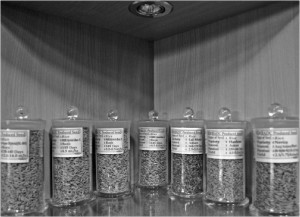 |
Photo: Amdadul Huq/Driknews |
In the field of Industrial Biotechnology Bangladesh is yet to make real breakthrough. Mass scale production of Spirulina, biofertilizer, bakers yeast, citric acid has been reached at the commercial stage. A few distilleries in the country are already utilizing >50,000 MT of molasses for the production of ethyl alcohol. In case of Environmental Biotechnology, mostly traditional techniques are being used for waste treatment and pollution control. Modern biotechnological methods are yet to be applied.
Bangladesh Institute of Nuclear Agriculture (BINA) developed Rhizobium biofertilizer for grain legumes such as lentil, chickpea, groundnut, mungbean and soybean which have significant demand in the country. The grain legumes are the protein meat substitute of the poor and an integral part of the daily diet. About 20% of grain legumes production was increased by using Rhizobium biofertilizer. Bangladeshi farmers can earn more by using the biofertilizer in the growing season improving the quality of the individual farmer, and society as a whole. Development of rice biofertilizer is in progress at BINA, NIB, and BAU.
Researchers of Bangladesh Atomic Energy Commission have established an irradiation technique to produce substantially increased production of silk from silkworm, Bombyx mori. Considerable progress has been achieved on Sterile Insect Technique (SIT) research by utilizing gamma irradiation. Bangladesh is identified as one of the world's biodiversity 'hot spots', rich in natural biological resources distributed in a wide range of different terrestrial and aquatic ecosystems.
Many of the biological resources are endemic to our country. Biotechnology offers many opportunities to convert these biological resources into economic wealth and employment opportunities within a framework established for sustainable consumption.
It is also relevant to mention that all over the world, the development of biotechnology has received government patronage at the initial stages owing to its multi-disciplinary nature and heavy investment costs. In Bangladesh, the activities connected with current biotechnological research come under the purview of several ministries. Therefore, biotechnology requires a close working relationship with multiple stakeholders including concerned ministries, universities, research institutes, private sectors, civil society, consumer groups, non-government and voluntary organizations and international bodies.
With an aim to accelerate the research activities in the field of biotechnology, the Government has established the National Institute of Biotechnology (NIB) under the auspices of Ministry of Science and Information & Communication Technology, as a center of excellence in Biotechnology. The NIB has the potential to become the coordinating centre for biotechnology research in
Bangladesh as well as a national resource centre for technology transfer and human resource development in new and emerging areas of biotechnology.
NIB conducts research in the areas of agriculture and environmental biotechnology, recombinant DNA technology and biotech product and process development. Presently, NIB has six research divisions, viz., plant, animal, fisheries, environmental and microbial biotechnology and molecular biology. It has facilities for plant tissue culture; recombinant DNA technology; DNA analysis including PCR, sequencing, etc.; DNA finger printing and profiling; enzyme technology and product analysis; microelement analysis of various environmental samples; and automated green house, hardening house and animal shed and house. NIB also provides long and short-term hands on theoretical and practical training of university students throughout the country.
The National Taskforce on Biotechnology of Bangladesh (NTBB), headed by the Hon' able Prime Minister, has approved national biotechnology policy for application of the latest innovations towards risk-free and health-proof development of agriculture, food, industry, environment and health sectors. The policy will also address some of the core issues involving intellectual property rights, bio-safety, bio-surveillance and bio-ethics with due emphasis on knowledge, innovation, and indigenous practices. The NTBB also approved National Guidelines for Fish and Animal Biotechnology, National Guidelines on Medical Biotechnology and Bio-Safety Guidelines of Bangladesh. A gazette notification has been published in January, 2008 by the Ministry of Environment and Forest about the Biosafety Guidelines of Bangladesh, allowing the trial of imported transgenic crops under stringent containment conditions. National Biosafety Framework (NBF) has also been published in June, 2007. Some of policy documents namely, National crops and forest biotechnology policy guidelines, action plan on biotechnology, update version of National Biotechnology Policy are in the process of approval.
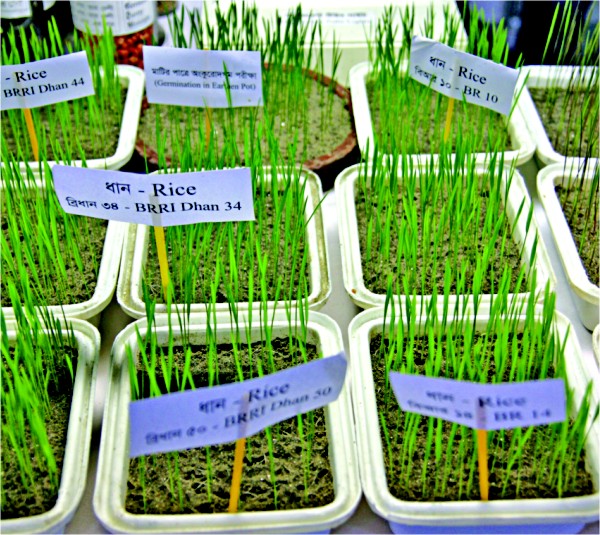
Photo: Amdadul Huq/drik News
National Executive Committee of Biotechnology (NECB), headed by the Principal Secretary to the Prime Minister's Office, is in charge for the implementation of the national policy on biotechnology to ensure speedy and risk-free development of the technology as per the directives of the national task force. The NECB will give approval to different projects to be submitted by the respective ministries in the light of policy objectives and programmes in different sectors of the national economy. During the formulation of the policy, inputs and suggestions were taken from the Agriculture, Fisheries and Livestock, Environment and Forest, Health and Family welfare ministries as the application of biotechnology would primarily involve these sectors. Based on the policy, the government is set to develop an action plan on biotechnology research to keep pace with the fastest-growing disciplines of biotechnology and genetic engineering. The impressive progress of the last few decades indicates that biotechnology can play a vital role in the socioeconomic development of a country. Short, mid, and long term action plan of this technology with time frame followed by adequate financial support is required for capacity buildings and to meet the challenges like food security and safety, management of sustainable environment for our national development.
The writer is Director General (additional charge) National Institute of Biotechnology Ganakbari, Savar, Dhaka.